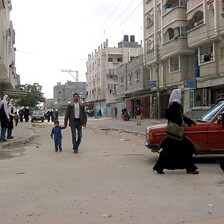November 15, 2006 at Hotel Al Deira, on the beach in Gaza City
Today is a holiday. It is Palestinian Independence Day, commemorating the day in 1988 when Yasser Arafat formally recognized the State of Israel, and declared a Palestinian State in the West Bank, Gaza and East Jerusalem. Now 18 years later, this holiday seems like some kind of a cruel joke, since Israel still refuses to renounce violence and recognize Palestine’s right to exist.
Under Clinton and the Oslo process, the Palestinians were forced to negotiate endlessly while walking backwards. Under Bush, Sharon and Olmert, there have been no negotiations, only unilateralism, arrogant violence, economic starvation and more disaster.
This is my first full day in Gaza on this trip and I am glad for this holiday. I need a day to just chill out, catch up on lost sleep and get used to my new surroundings. The last few days getting out of Jenin and into here have been exhausting and stressful. And, yes, I am scared about what might happen here during the next seven days.
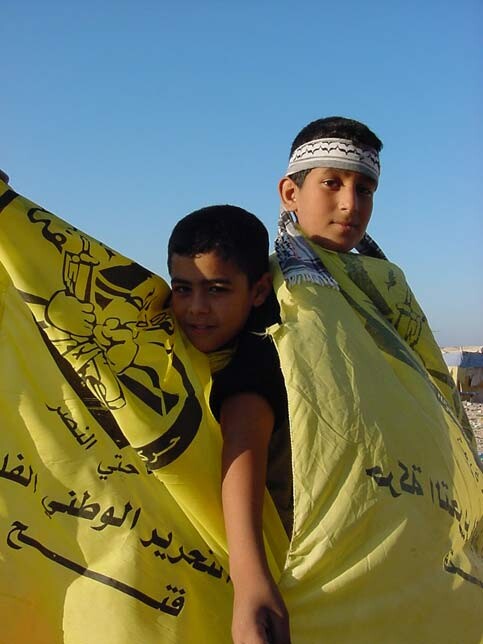
Palestinian boys from a Fateh family on the beach near the marina. (Dr. Bill Dienst)
I am down in the restaurant eating lunch here at the Funduq Al Deira overlooking the beach here in Gaza City. Suddenly my mobile phone rings. I pick up and say “hello” but no one answers. The mobile phone service here in Israel-Palestine is terrible. I have an Orange phone, which works well in Israel, but not Gaza or most of the West Bank. I should have bought a Jawwal phone, which works better in most but not all parts of the West Bank and Gaza and not so well in Israel. Some activists in the Occupied Palestinian Territories carry one phone of Orange and one of Jawwal so they can call with fewer dead zones no matter where they are.
My phone rings again and I here a woman’s voice in Hebrew, apparently a recording. What is she saying?
The phone rings again, and now I have two text messages. One is in Arabic written in phonetic English and the other is totally cryptic and I can make no sense of it. Am I being located? Is this some sort of spy agency getting coordinates on me? I need to get out of here!
I summon the waiter and pay the bill, go back to my room and lock the door. I call my contact Hussam on his day off at Gaza Community Mental Health Programme. “Do you feel you are in immediate danger?” he asks.
“Yes” I answer. He shows up after another 20 minutes. He looks at my phone. The women’s voice in Hebrew turns out to be a promotional advertisement for the Orange phone company, as is the voice text message in English phonetic Arabic. The cryptic messages on my voice mail are people in the West Bank trying to call me, but the signal here is too weak. I should have bought a Jawwal phone.
I spooked and over-reacted. I let my paranoia get the best of me. I feel embarrassed. Hussam says “No problem.” He understands. He wouldn’t advise an American to come to Gaza right now, and he appreciates my commitment and courage for coming here. I feel better. Hussam heads home to be with his family.
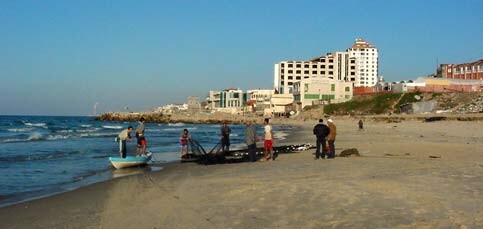
The beach in front of Hotel El Deira in Gaza City. El Deira is the rose colored building. In the distance on the left is the coal fired power plant in Ashkelon, Israel, which can be seen from all over Northern Gaza. Gaza fishermen are seen on the beach. (Dr. Bill Dienst)
In the early evening, Marwan, Hussam’s associate at Gaza Community Mental Health Programme, takes me to visit his wife and children at his apartment. He shows up with his wife, four children and family friend. We stuff all eight of us in his small car. As we approach his apartment, the lights go out in his entire densely populated neighborhood. Power outages have been very frequent here since this past June, when Israeli jets bombed the main power station in Gaza. Slowly this is being repaired, and the power outages aren’t as frequent as they were before, but they are still quite common.
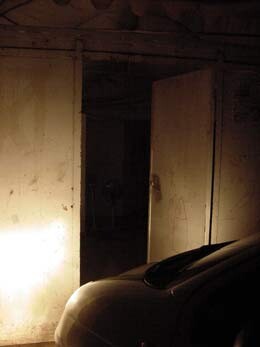
Power outage in Marwan Diab’s densely populated neighborhood in Gaza City. Headlights light the way so his wife can light the propane lantern so his children will not be afraid. (Dr. Bill Dienst)
He shines his headlights of his car so his family can get inside, and then his wife turns on the propane lantern so the children can see and not be afraid. We spend the early evening eating falafel sandwiches and drinking fruit juice while playing with his kids. The lights come back on, and then I head back to Hotel El Deira.
Now it is after 11 pm. I have just finished my tea here at the Hotel Al Deira restaurant; a place that gives you the feeling of Cafe Rick’s in the movie Casablanca, except no alcohol is served here, as Islam forbids it.
In its place are narghileh water pipes which serve mixtures of tobacco with apple, cherry, licorice or other flavors. There is a whole page in the restaurant menu devoted to narghileh flavors.
Regardless of religion, coffee, tea and tobacco have long been part of the culture here. Probably 90 percent of the men here in Palestine smoke cigarettes, many obsessively. Maybe only 20 percent of the women do, and most of these limit it to the narghileh pipe on social occasions.
If we ever reach a point where Palestinians no longer fear sudden violent disability and death, a massive public health campaign could be launched to reduce cigarette use. Until then, it is pointless to talk about it.
Alcohol use is rare here in Gaza, but hashish is also used. It gets here from Egypt somehow. I have heard about it, but have never seen it while here.
My colleagues at Gaza Community Mental Health Programme tell me that other harder drug users also exist sporadically here in Gaza, but supplies are difficult and they are relatively rare compared to other societies.
Harder drugs like heroin, cocaine and amphetamines are used widely in Israel, according to what I have been told by psychiatrists and taxi drivers there. The use there is comparable to use rates in Europe and North America and perhaps higher. Places in Israel like Jaffa and Lod apparently have open air drug markets on the street. One taxi driver source told me the drugs are brought into Israel by the Russian Mafia and other organized crime syndicates.
In Gaza, there is no need for stimulants like amphetamines or cocaine. The population here is constantly force fed the strongest stimulant of all: fear.
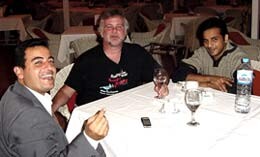
Sami Abu Salem, journalist for Wafaa Press Service, and frequent contributor to Electronic Intifada, me, and Hassan Ali Baker, who is a web based financial consultant. Hassan’s brother Suheil was killed 8 months ago by a missile fired by an unmanned Israeli drone; we are at the El Deira Hotel Restaurant on the beach in Gaza City. (Dr. Bill Dienst)
Here in this restaurant too are Palestinian professionals like doctors, journalists and human rights workers who are sponsored by international non-governmental organizations or the Palestinian Authority. These are the few among local Gazans who can still afford to come here amidst growing economic isolation, poverty and despair that presently grips the Gaza Strip.
Now I am gradually becoming aware of persistent helicopter sounds outside El Deira coming from over the beach. I venture out on the veranda and meet Barb, Fredi and Stephan, who are a French TV news crew on assignment in Gaza for ARTE TV.
The helicopter sounds are loud, but I still can’t see the chopper in the darkened partially cloudy skies over the beach and Mediterranean Sea. “Is that an Israeli military helicopter?” I ask to no one in particular.
“No,” answers Muhammad Ali, a local Palestinian from Gaza who is providing support for the French news team. “That’s [Hamas Prime Minister] Ismail Haniyeh’s helicopter.”
“Ismail Haniyeh has a helicopter?” I ask incredulously.
“No, of course not. The Israelis will never let any Palestinians have a helicopter.”
“Abu Ammar [Yasser Arafat] used to have a helicopter.” I answer.
“Yes and look what happened,” responds Muhammad Ali. “They blew up his helicopter on the ground in Ramallah, put him under house arrest in the Muqata’a for over 2 1/2 years, and then later they poisoned him!”
“Yeah I suppose your right. So that’s an Israeli military helicopter overhead then.”
“Of course!” replies Muhammad Ali.
Barbara, the French TV newswoman says she sees the helicopter. I look hard, but still can’t see it. But just then, I see the flares and then hear the loud roar of two missiles being fired over us.
I cower reflexively. I am starting to freak out as I have never seen guided missiles fired over me before. The “fight or flight” mechanisms of my sympathetic nervous system are on overdrive.
Muhammad Ali hugs me reassuringly and says “Don’t worry; they’re not shooting at us. There are too many white people here. The Israelis get in big trouble when they maim and kill white people. So we’re safe here.”
Then he and others say words to this effect:
The Israeli military attacks the poor and destitute in the refugee camps and along their borders mostly. That way they kill only Palestinians and keep their own casualties low. Israeli Prime Minister Olmert and Defense Minister Peretz can then act tough without burning much fuel fighting domestic opposition. Sometimes they fire missiles into Gaza City, but never here where the Westerners are.
If they ever decided to bring ground troops into Gaza City, they would suffer the same number of casualties as they did last summer in southern Lebanon, let me assure you. Their people and the western world are quite indifferent to Palestinian casualties, but they can’t stand large numbers of Israelis dying or being maimed.
November 16, 2006
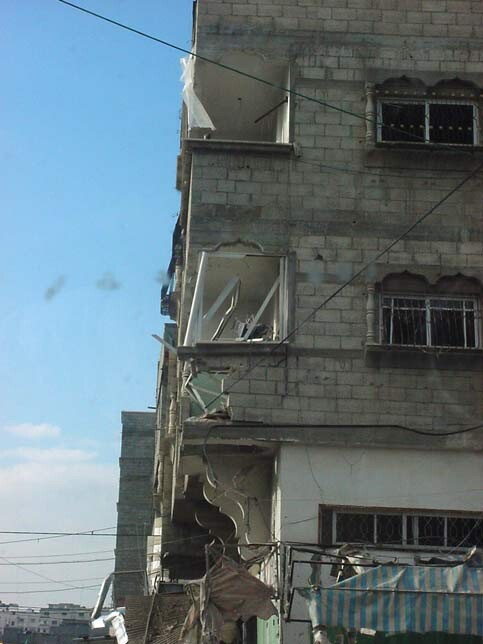
Destruction from the 15 November helicopter launched missile attack on Beach camp north of Gaza City seen on 18 November. (Dr. Bill Dienst)
This morning, I hear on Al Jazeera TV in English that the rockets that we saw last night that were fired from the helicopter hit apartment buildings in Beach Refugee Camp to the north and Jabalya Refugee Camp to the northeast. An unmanned drone also fired a rocket at a third target. I am not sure about how many people were injured or killed.
Fear is a powerful stimulant. But like any drug, repetitive chronic exposure causes a drug tolerance such that one requires higher and higher of doses of fear to achieve the same effect. I am starting to understand how this plays on the psyche of people who live here, like my friend Hassan, who lives in the southern part of Gaza City.
Eight months ago Hassan’s younger brother and two of his friends were targeted by an Israeli unmanned drone that fired a missile into their car killing all of them. Hassan had just seen his brother alive, five minutes before he was killed. He then had to identify his brother’s corpse. Hassan’s brother was literally ripped into two pieces. His head and right torso was torn away diagonally from the left torso and the rest of his body.
Hassan has cried so long and so hard that he cannot cry anymore. He walks the dark streets of Gaza City with cars whizzing by us. He doesn’t show the fear that I do of being hit by a car. He can’t live his life being miserable all the time in constant panic about what might happen, for then, what is the point of living? So he goes about his daily business knowing that God will decide when it is his time.
I suppose this is a positive coping mechanism for the people who must live here in this current horrific situation of constant overstimulation by fear.
Dr. Bill Dienst is a rural family and emergency room physician from Omak, Washington, USA.





